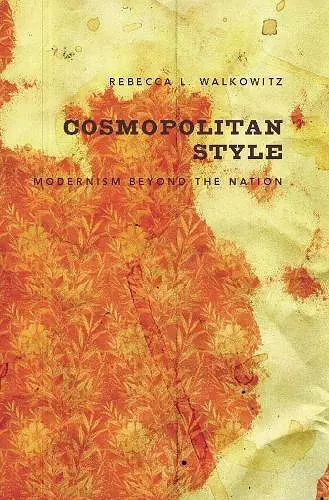Cosmopolitan Style
Modernism Beyond the Nation
Format:Paperback
Publisher:Columbia University Press
Published:26th Oct '07
Currently unavailable, and unfortunately no date known when it will be back

Rebecca L. Walkowitz argues that modernist literary style has been crucial to new ways of thinking and acting beyond the nation. While focusing on modernist narrative, Walkowitz suggests that style, conceived expansively as attitude, stance, posture, and consciousness, helps to explain many other, nonliterary formations of cosmopolitanism in history, anthropology, sociology, transcultural studies, and media studies. Walkowitz shows that novelists James Joyce, Joseph Conrad, Virginia Woolf, Salman Rushdie, Kazuo Ishiguro, and W. G. Sebald use the salient features of literary modernism to explore different versions of transnational thought, question moral and political norms, and renovate the meanings of national culture and international attachment. Joyce, Conrad, and Woolf developed a repertoire of narrative strategies at the beginning of the twentieth century that were transformed by Rushdie, Ishiguro, and Sebald at the end. By deploying literary tactics of naturalness, triviality, evasion, mix-up, treason, and vertigo, these six novelists promote ideals of democratic individualism within collective projects of antifascism and anti-imperialism. In this unique and engaging study, Walkowitz brings to the forefront the artful idiosyncrasies and political ambiguities of twentieth-century modernist fiction.
Focusing on modernist narrative, this book suggests that style conceived expansively as attitude, stance, posture, and consciousness helps to explain many other, nonliterary formations of cosmopolitanism in history, anthropology, sociology, transcultural studies, and media studies.In this broad-ranging and ambitious intervention in the debates over the politics, ethics, and aesthetics of cosmopolitanism, Rebecca L. Walkowitz argues that modernist literary style has been crucial to new ways of thinking and acting beyond the nation. While she focuses on modernist narrative, Walkowitz suggests that style conceived expansively as attitude, stance, posture, and consciousness helps to explain many other, nonliterary formations of cosmopolitanism in history, anthropology, sociology, transcultural studies, and media studies. Walkowitz shows that James Joyce, Joseph Conrad, Virginia Woolf, Salman Rushdie, Kazuo Ishiguro, and W. G. Sebald use the salient features of literary modernism in their novels to explore different versions of transnational thought, question moral and political norms, and renovate the meanings of national culture and international attachment. By deploying literary tactics of naturalness, triviality, evasion, mix-up, treason, and vertigo, these six authors promote ideas of democratic individualism on the one hand and collective projects of antifascism or anti-imperialism on the other. Joyce, Conrad, and Woolf made their most significant contribution to this "critical cosmopolitanism" in their reflection on the relationships between narrative and political ideas of progress, aesthetic and social demands for literalism, and sexual and conceptual decorousness. Specifically, Walkowitz considers Joyce's critique of British imperialism and Irish nativism; Conrad's understanding of the classification of foreigners; and Woolf's exploration of how colonizing policies rely on ideas of honor and masculinity. Rushdie, Ishiguro, and Sebald have revived efforts to question the definitions and uses of naturalness, argument, utility, attentiveness, reasonableness, and explicitness, but their novels also address a range of "new ethnicities" in late-twentieth-century Britain and the different internationalisms of contemporary life. They use modernist strategies to articulate dynamic conceptions of local and global affiliation, with Rushdie in particular adding playfulness and confusion to the politics of antiracism. In this unique and engaging study, Walkowitz shows how Joyce, Conrad, and Woolf developed a repertoire of narrative strategies at the beginning of the twentieth century that were transformed by Rushdie, Ishiguro, and Sebald at the end. Her book brings to the forefront the artful idiosyncrasies and political ambiguities of twentieth-century modernist fiction.
Recommended. Choice A valuable book... Walkowitz deserves our praise for her openness, her ambition, and her willingness to take on so demanding a critical task. -- Dominic Manganiello James Joyce Literary supplement creative and refreshing -- April Bullock Journal of Colonialism and Colonial History My own work on cosmopolitan fiction will be enriched by this ambitious book, as will the work of other critics in modernist studies, globalization studies, and feminist studies who study the relationship between aesthetics and ethics, private and international experience, modernism and immigration, and feeling and critique. Comparative Literature Shrewdly conceived, well-informed, and well-executed... this book is an impressive debut that imaginatively realigns and redefines those essentially contested terms: modernism and the cosmopolitan. Comparative Literature Studies [Walkowitz] proposes that discomfort is the only objective left for art that understands itself as such. This stance makes her work stand out in a field of modernist studies that currently abounds with talk of transnational affiliation and the global reach of early twentieth-century fiction. Novel Cosmopolitan Style convinces with its assertion that contemporary cosmopolitanism - both fictive and theoretical - owes a good deal to modernist texts, and with its vision of the ways modernist style disrupts standard, homogenized forms of national belonging. Twentieth-Century Literature
ISBN: 9780231137515
Dimensions: unknown
Weight: unknown
248 pages